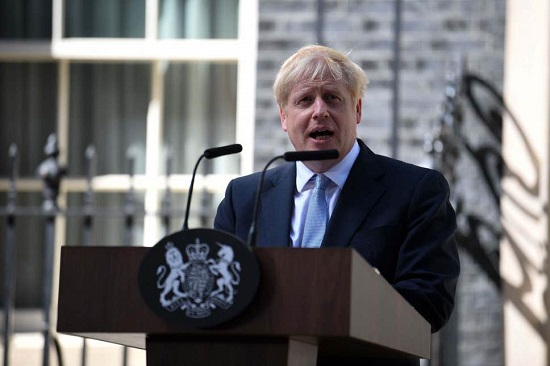This post has already been read 1410 times!
Britain readied on Wednesday to intentionally breach its EU divorce treaty with new legislation that critics warned would undermine its global standing and any hopes for an orderly exit out of the world’s biggest single market.
Prime Minister Boris Johnson’s government was to submit a new bill governing the UK’s own internal market across its devolved nations, to take effect after the expiry of a transition period out of European Union membership in December.
The government maintains the changes are needed to smooth post-Brexit trade between England, Scotland, Wales and Northern Ireland, and help power a recovery from the coronavirus pandemic.
Scotland’s First Minister Nicola Sturgeon vowed to fight the bill, branding it a “full frontal assault on devolution”.
Health Secretary Matt Hancock said he was “comfortable” with Britain breaking obligations under its EU Withdrawal Agreement, having only belatedly apparently discovered problems with the treaty’s provisions for Northern Ireland.
“The primary international obligation around this issue is to protect the peace process in Northern Ireland and I very much hope we conclude a deal before the end of the transition period,” he told Times Radio.
‘Moral high ground’
Critics accused the British government of engaging in bad-faith diversionary tactics as it battles Brussels on key issues such as state subsidies and fishing rights.
Jonathan Jones, the head of the government’s legal department, resigned on Tuesday, reportedly because he refused to endorse the new bill.
Tobias Ellwood, Johnson’s Conservative colleague who chairs the House of Commons defence committee, told BBC radio that breaching the Brexit treaty meant Britain would “lose the moral high ground”.
“How can we look at countries such as China in the eye and complain about them breaching international obligations over Hong Kong, or indeed Russia over ballistic missiles, or indeed Iran over the nuclear deal, if we go down this road?” he said.
The internal market bill comes as British and EU negotiators are engaged in fraught talks to agree a new trading relationship by a crunch EU summit in mid-October and in time for its implementation from January 1 next year.
“Any attempts by the UK to undermine the (withdrawal) agreement would have serious consequences,” European Parliament president David Sassoli warned.
Prime minister Micheal Martin of Ireland, the EU member with most to lose from a chaotic Brexit, vowed to speak to Johnson to register “very strong concerns about this latest development”.
Martin’s deputy Leo Varadkar said Lewis’s language amounted to a “kamikaze” threat by Britain, but had “backfired”, given the scale of angry reactions in Northern Ireland, the EU and also among Democratic politicians in the United States.
“I think governments are scratching their heads around the world wondering whether they should ever enter into treaties or contracts with the British government if this is their attitude,” he told RTE radio.
Biden camp weighs in
Northern Ireland will have Britain’s only land border with the EU, and a protocol of the Withdrawal Agreement means the territory will continue to follow some of the 27-nation bloc’s rules to ensure the frontier remains open.
Removing a hard border between Ireland and Northern Ireland was a key part of the 1998 Good Friday Agreement that brought an end to 30 years of violence in the British-ruled province.
But under the new legislation, Britain intends unilaterally to give itself new powers to regulate post-Brexit trade involving Northern Ireland, in violation of the Withdrawal Agreement, arguing they are necessary to preserve the peace.
The row stretches well beyond Europe. The United States was a key broker of the Good Friday Agreement, and Democrats are warning of consequences for a separate US-UK trade deal if London backtracks on its EU obligations.
A senior foreign policy adviser to Joe Biden, President Donald Trump’s opponent in the November election, said the Democrat was “committed to preserving the hard-earned peace & stability in Northern Ireland”.
“As the UK and EU work out their relationship, any arrangements must protect the Good Friday Agreement and prevent the return of a hard border,” Antony Blinken wrote on Twitter.



